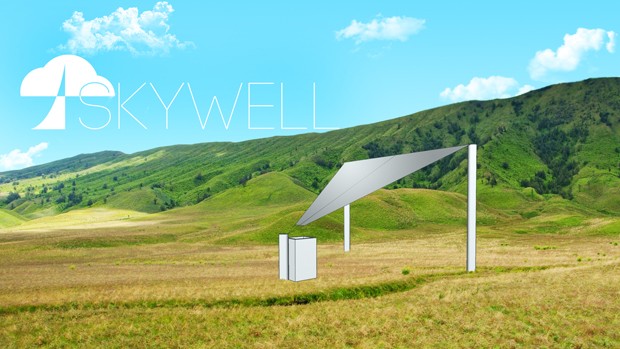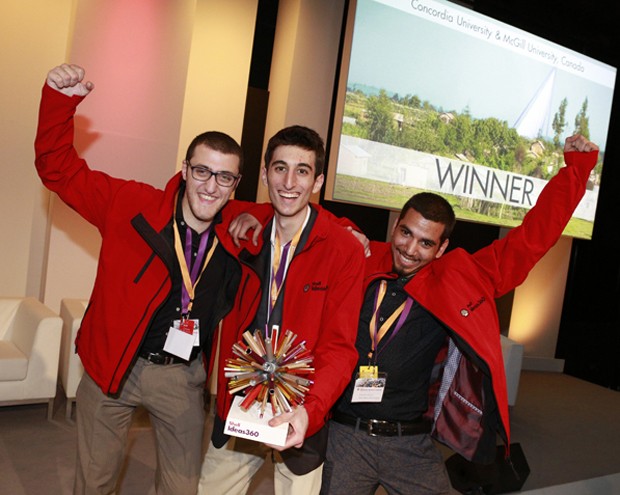Concordia-McGill team triumphs in global sustainability challenge
Inspired by a second-grade history lesson on the ingenuity of the nomadic Bedouin people, Sami Sayegh has imagined a highly efficient method of capturing water from the air in some of the world's most arid locales.
Sayegh, a recent graduate in Arts and Science at McGill University, shared his idea with Concordia students Charles Gedeon and Al-Hurr Al-Dalli. The result is the modular, lightweight Skywell — a concept that won the Best Project prize at the international student competition Shell Ideas360 in Amsterdam, Netherlands, on May 15.
"The interdisciplinary team collaborated to create a clear, compelling message that caught — and held — the audience's and the jury's imagination,” says Deborah Dysart-Gale, chair of Concordia’s Centre for Engineering in Society. Dysart-Gale accompanied the team to the Netherlands, where it took "Best Presentation" as well as "Best Project."
Resembling a grounded hang glider, the Skywell comprises a large sail with a hydrophobic coating mounted on four poles angled down towards a reservoir. Dew that forms during the cool nights trickles down and is collected, ready to be used immediately or stored for drier seasons.
“One technique the Bedouins had for dew harvesting was before they would sleep, they would dig a hole, place a tarp and place a stone in the centre to weigh it down, and when they would wake up in the morning they would find some water had accumulated,” Sayegh says.
“With the Skywell, we wanted to scale that up to get more water using this technique to sustain a small community.” The accumulation of water could be as high as 110 litres a day.
“The dew-capture technology is elegantly simple, but faces some significant challenges,” Dysart-Gale says. “However, the team’s message is perfect for recruiting people to help solve these."
As Team GLAS, Gedeon and Al-Dalli made an award-winning 20-minute pitch to a panel of international judges on Wednesday, May 14 in Amsterdam. Sayegh joined his partners via an online video link.
Together, the team was responsible for taking the Skywell into the final five of Shell Ideas360. The competition garnered 668 submissions, as students from around the world tried to come up with innovative, inexpensive and sustainable solutions to global water, energy and food problems.
The finalists hailed from Australia, India, Singapore and the Netherlands. As winners of the Best Project prize, Sayegh, Gedeon and Al-Dalli are offered a National Geographic expedition.
The Concordia-McGill trio are old friends: hailing from the same high school in Abu Dhabi in the United Arab Emirates, they all moved to Montreal for university.
Al-Dalli, who is an undergraduate film student at Concordia, was responsible for the team's video submission and for analyzing the geopolitical issues that might arise in developing countries.
Gedeon, who just finished his marketing degree at the John Molson School of Business, used his graphic design experience to generate a computer model of the Skywell. He also connected the team to Xavier-Henri Hervé, the director of District 3, Concordia's multidisciplinary innovation centre.
Hervé coached Team GLAS in the art of pitching — a skill that Sayegh, Gedeon and Al-Dalli put to use in their award-winning presentation.
“When you're doing a competition like this, the method for how you pitch and communicate has to be very effective,” he says. “You have to understand what the judging criteria are.”
Alan Shepard, president of Concordia, congratulated the winners. “I am proud of our students’ innovation and global engagement. I am also thrilled to see Concordia’s District 3 nurturing such transformative ideas and helping them shine on the international stage.”
For Team GLAS, Shell Ideas360 may be just the beginning. Gedeon hopes interest in the Skywell will extend to the NGO sector, and even the United Nations.
“We’ll continue working together to get investment and do more research to see if there is a potential for this to grow,” Gedeon says.
Sayegh agrees. "This has been great validation for Skywell, and the next step right now is to focus on finalizing the design and building a prototype in preparation for launching a pilot project."
Watch a video about the Skywell project.


